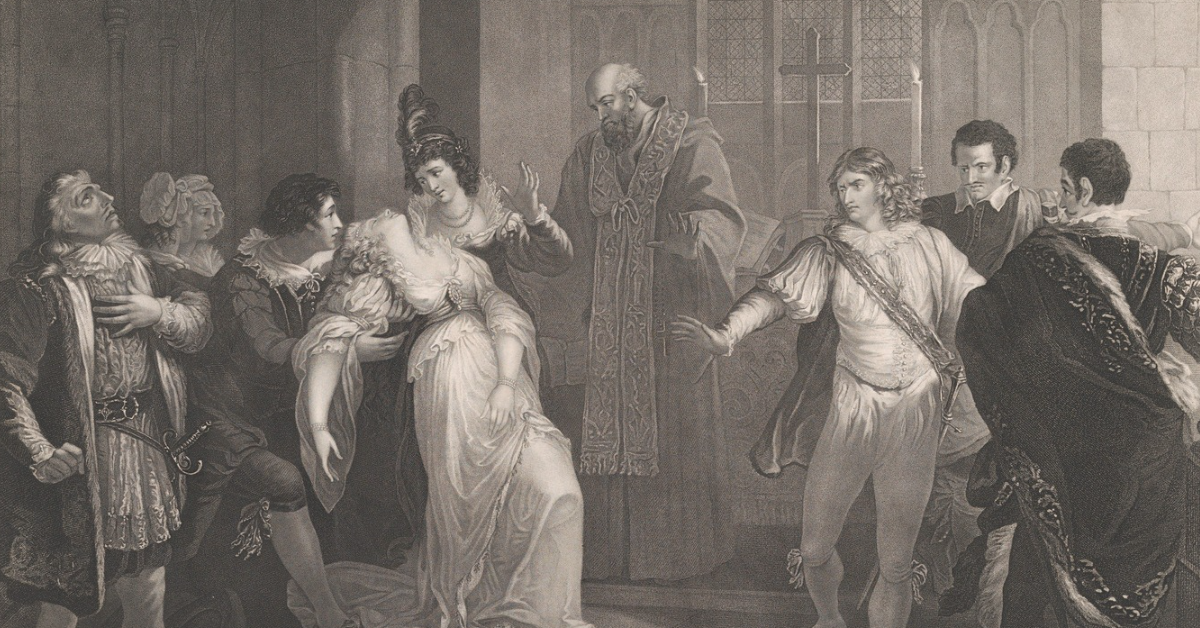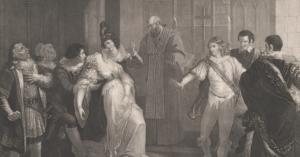

Image: Hero Fainting in Church (Shakespeare, Much Ado About Nothing, Act 4, Scene 1), print, Jean-Pierre Simon, after William Hamilton (MET, 42.119.532)
The Campion Theatre Society is eagerly preparing for their upcoming production of Shakespeare’s Much Ado About Nothing, a play brimming with wit, romance, and unforgettable characters. As the excitement builds, we’ve compiled 10 of the most memorable quotes from the play to give you a taste of the brilliance you can expect. Whether you’re a seasoned Shakespearean or new to the Bard, these lines are sure to get you excited for the show!
1. “I do love nothing in the world so well as you—is not that strange?” – Benedick
Benedick, a witty soldier, reluctantly confesses his love for Beatrice in this pivotal moment. His declaration is both heartfelt and humorous, showcasing Shakespeare’s ability to blend emotion with wit.
If Benedick’s struggle with love and vulnerability resonates with you, consider reading the full exchange between Benedick and Beatrice in Act 4, Scene 1 for a deeper understanding of their dynamic.
2. “Some Cupid kills with arrows, some with traps.” – Hero
Hero comments on the different ways love can ensnare people, whether through direct affection or more cunning means. This quote highlights the play’s exploration of love’s complexities and the various forms it can take.
Explore Hero’s perspective on love further in Act 3, Scene 1, where she and her companions scheme to bring Beatrice and Benedick together.
3. “For which of my bad parts didst thou first fall in love with me?” – Beatrice
Beatrice’s sharp wit shines through in this playful question to Benedick. Her reluctance to show vulnerability is evident as she masks her true feelings with humor.
To see more of Beatrice’s sharp banter, delve into Act 5, Scene 2, where she continues to challenge Benedick with her quick wit.
4. “When I said I would die a bachelor, I did not think I should live till I were married.” – Benedick
Benedick’s humorous admission marks a turning point in his character, as he begins to soften his stance on marriage and love, realizing that circumstances and feelings can change over time.
If Benedick’s changing perspective on love interests you, explore Act 2, Scene 3 for more on this pivotal moment.
5. “Let me be that I am and seek not to alter me.” – Don John
Don John, the play’s antagonist, declares his unwillingness to conform or pretend to be something he’s not. This quote reveals his bitterness and desire to remain true to his nature, even if it means being the villain.
To learn more about Don John’s role in the play, explore Act 1, Scene 3.
6. “O, what men dare do! What men may do! What men daily do, not knowing what they do!” – Claudio
Claudio’s exclamation underscores the play’s exploration of human behaviour and the consequences of actions taken in ignorance or haste. It’s a reflection on the folly and unpredictability of human nature.
To dive deeper into Claudio’s internal struggle, read Act 4, Scene 1, where he reacts to a devastating misunderstanding.
7. “In time the savage bull doth bear the yoke.” – Don Pedro
Don Pedro suggests that even the most resistant individuals, like Benedick, will eventually submit to love. This quote reinforces the play’s recurring theme of love’s power to change even the most stubborn hearts.
For more on Don Pedro’s role as a matchmaker and his views on love, see Act 1, Scene 1.
8. “Speak low if you speak love.” – Don Pedro
A subtle reminder that love is often best expressed quietly and intimately, without the need for grand gestures or declarations. This quote captures the play’s nuanced portrayal of romance.
To understand the context of this line, explore Act 2, Scene 1, where Don Pedro woos Hero on Claudio’s behalf.
9. “I will live in thy heart, die in thy lap, and be buried in thy eyes.” – Benedick
Benedick’s poetic declaration of love is both romantic and humorous, reflecting his character’s growth from cynicism to sincere affection.
For more of Benedick’s declarations of love, look into Act 5, Scene 2, where he continues to charm Beatrice with his words.
10. “Everyone can master a grief but he that has it.” – Benedick
Benedick points out the ease with which people offer advice on handling grief, even though they may not fully understand the pain of the person experiencing it. This quote highlights the play’s exploration of empathy and the human condition.
To see how this sentiment plays out in the story, read Act 3, Scene 2, where Benedick reflects on the nature of grief and love.



